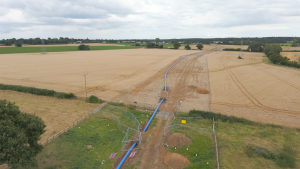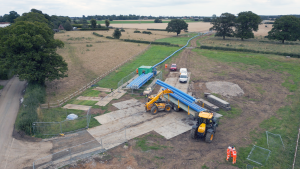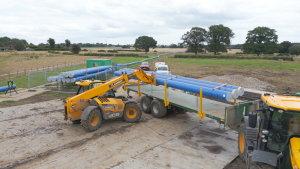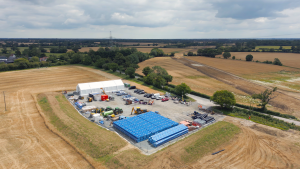@one Alliance head delivery of £70m strategic pipeline leg
21st November 2024 Barhale, as part of the @one Alliance, has been in the role of principal contractor for the 36km pipeline that will significantly strengthen water supply resilience across the East of England.
Barhale, as part of the @one Alliance, has been in the role of principal contractor for the 36km pipeline that will significantly strengthen water supply resilience across the East of England.
The £70m project will construct the LRT, the pipeline that forms the southeasternmost leg of Anglian Water’s Strategic Pipeline Alliance (SPA).
SPA has been created to build hundreds of kilometres of new large-scale pipeline to allow movement of water from areas of surplus water in the north of Anglian Water’s footprint to address potential deficits in its south.
Barhale Director, James Haddon underlined the importance of the project in ensuring that future water requirements can be met.
“Anglian Water is facing the double impact of lower levels of rainfall than other parts of the UK and rapid population growth in its south and east pushing up demand,” he said. “By facilitating the large scale movement of water across the region, the LRT will strengthen network resilience and secure water supply for the future.”
LRT runs from Little Whelnetham near Bury St Edmunds to Wherstead Treatment Works south of Ipswich.
The 450mm pipeline will be laid through opencut at a depth of 1.2 metres except when negotiating the numerous crossings – which include several water courses, the A12 road and the Ipswich to London rail line – where directional drilling will be employed.
Design work has been undertaken by Jacobs.
According to Matt Jansen, contracts manager at Barhale, the entire pipeline has been designed to have the lowest carbon footprint possible, in line with Anglian Water’s pledge to reach net zero carbon by 2030.
“There is a clear focus on decreasing environmental impact and delivering an excellent carbon performance across the entire LRT,” he said. “For example, the reference design has been changed to remove 50% of compound and laydown areas and by reusing the material that is excavated, we can make a big saving on aggregate usage.
“We have also looked for efficiencies across construction so through clever scheduling we can halve the number of welding machines and by using Beet Pads – the large areas of hardstanding reserved for storing sugar beet – for laydown and compounds we can reduce the carbon footprint and drive economies.
“We have also conducted extensive environmental assessments. The route is being fine-tuned and works will be timed to minimise impact on flora and fauna.”


